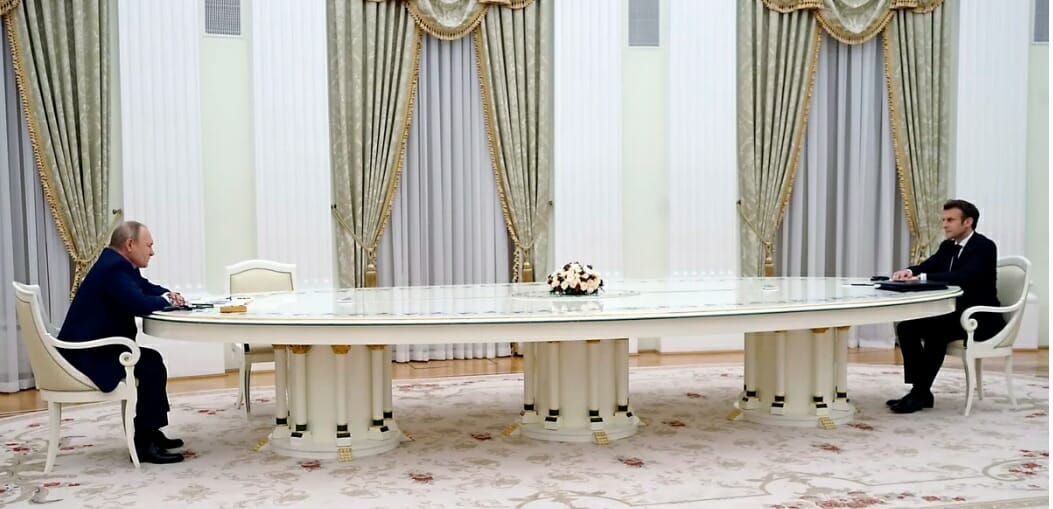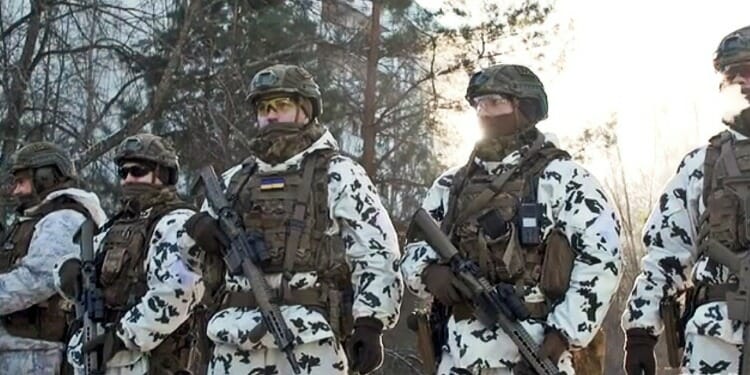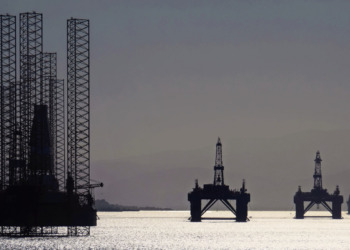Update February 14, 2022: News has just come out that Ukraine has made a request via the Organisation for Security and Cooperation in Europe (OSCE) for Russia to explain its build-up of troops. Under the Vienna Document, of which Russia is a party to, OSCE members can ask for information on a member’s military activities.”If Russia is serious when it talks about the indivisibility of security in the OSCE space, it must fulfill its commitment to military transparency in order to de-escalate tensions and enhance security for all,” Foreign Minister Kuleba said. This is the first time that recourse has been made to the OSCE and it’s a very encouraging sign: That is the argument I made in this OpEd and my hopes are high that more good news is on the way – including an eventual recourse to the UN Security Council.
Putin’s saber-rattling is having its effect on the West and everyone talks as if war in Ukraine is inevitable. But is it really inevitable? And is it all Putin’s fault? Are we sure that we in the West took all the necessary measures to avoid war? Why didn’t we have recourse to the United Nations Security Council and call Putin’s bluff, forcing him shamefully to veto any resolution against him? Why didn’t we have recourse to the one and only European organization mandated to oversee security and collaboration in Europe, i.e. the Organization for Security and Cooperation in Europe?
These are daring questions to ask, and I’m well aware it opens one to accusations of unpatriotic behaviour. Let me be clear at the outset, by asking these questions I don’t mean to give Putin any support: I consider him a bully, an ex-KGB sergeant affected by Soviet empire nostalgia with the dangerous objective of restoring the splendors of czarist Russia; there is a real possibility that if he is not careful about avoiding unnecessary destructive wars, future historians will classify him along with Stalin and Hitler. But they are necessary questions, as everyone seems to be engaged in their own bit of saber-rattling, and some do so when they shouldn’t, when it’s not within their remit to do so.
Take NATO Chief, Jens Stoltenberg. Only yesterday at a press conference, he came out publicly saying that Russian deployment in Belarus is “the biggest since the Cold War” and he said Western allies “must be prepared for the worst”.
Big words – picked up in the press around the world.
But should the NATO chief be the one issuing such warnings publicly and should he be listened to? He’s not the NATO “chief”, he is a Norwegian politician who became NATO’s 13th secretary-general in 2014, and in that position, he is responsible for the functioning of the organization, not its policy decisions And NATO policies are in the hands of its member countries, it’s a military alliance where in principle each member has equal vote in determining NATO policy responses – though the US, on the basis of being the highest paying member, holds NATO in its hands. But in any case, NATO policies are definitely not within Stoltenberg’s mandate and he shouldn’t be allowed to make such public declarations, and much less listened to.
Meanwhile, Biden urges Americans to leave Ukraine immediately – he won’t send troops to defend them if Russia invades. Once again, this is a war that falls back on European shoulders – not Americans.
Yet now that the world’s attention has been brought on the additional 30,000 Russian troops that have begun their drill with Belarus troops on Belarus soil that happens to confine with Ukraine, should we worry? The joint drill reportedly involves tens of thousands of troops and is expected to last 10 days. And Reuters reported that Russia has moved blood supplies and other medical equipment to treat casualties in the area near Ukraine – that particular news suggesting that Russia was serious about preparing for war, came out two weeks ago (January 28) and was the fruit of US intelligence.
Once again, we should note US officials are the ones busy fanning the winds of war. Of course, we all took due note of President Joe Biden’s prediction that a Russian assault was likely and of U.S. Secretary of State Antony Blinken’s remarks that Russia could launch a new attack on Ukraine at “very short notice.”
Warlike statements are repeatedly coming from America, and there’s nothing surprising in this. Biden is trying hard to appear tough on Russia. He needs to recompact his following and regain lost ground as his popularity has plummeted, precisely in the crucial year of the midterm elections and the Republicans look set to regain control of Congress.
Moreover, the tough part of any war in Ukraine will not fall on America but on Europe.
The proposed sanctions on Russia as a response to war in Ukraine will hurt Europe – not America
Sanctions are hard to take for Europeans given the deep economic links – not to mention the geographic proximity: We all live on the same continent, we are linked in numerous ways, our links are historical, logistical, commercial and of course cultural. Russian literature and art have mattered and influenced Western Europe for centuries. Who hasn’t read Tolstoy’s War and Peace and cried over it?
War in Ukraine is yet another war in Europe, akin to a civil war, a war between brothers and that is not something we need. Not after World War II and the wars in the Balkans.
Sanctions are currently being discussed in Brussels. The European Commission has been entrusted with making ready a unified European response with sanctions should Russia invade Ukraine. A difficult task! It requires agreement on a list of sanctions that could be adopted quickly without the need for lengthy deliberations.
Austria and Hungary stand out as the reticent ones because of their special economic links. But they’re not the only ones dragging their feet. Italy is not happy either but is more subtle about it. According to Politico that follows matters closely in Brussels, only two countries are willing to cap trade ties with Russia. Which ones is not known, but one may assume that Spain is willing since its Minister for Foreign Affairs José Manuel Albares said to Playbook: “I think it is normal that there are nuances in the positions that we all have, because we do not have the same geographical position, the same historical relations with Russia, nor the same economic relations.” But he added: “The reality is that when we took that decision [to impose significant costs on Russia], it was with consensus, and it binds us all.”
Capping trade with Russia could have unwanted long-term effects, as Russia would seek supplies outside Europe – i.e. engage in “import substitution” – and thus grow less dependent on the EU. This point was forcefully made by Italy that reportedly said sanctions “should be based on an in-depth cost-benefit-analysis, that should inter alia determine how to influence Russia more effectively, preserving the capacity of the EU to act as a major player vis-à-vis Russia.”
As to Germany, it already made clear last month that it would not support the idea voiced by the US of isolating Russia from the SWIFT international payments system, for many obvious economic reasons, not least because they needed a way to pay for Russian gas. And other EU countries such as Italy also backed that position.
Calls to exclude Russia from SWIFT are nothing new. Last year, on April 29, the European Parliament passed a resolution to do so in case Russia invaded Ukraine. A previous episode occurred in August 2014, when the UK appealed to European leaders to consider such an option. Alexei Kudrin, Russia’s former finance minister, then forecast that such a move could cause Russia’s GDP to shrink by 5 percent. Ultimately, the idea was dropped as then prime minister Dmitry Medvedev put it, it was tantamount to “a declaration of war.”
Actually, the most potent economic retaliation available to the West is undoubtedly the Russia-to-Germany gas pipeline, Nord Stream 2. Four days ago, after meeting German Chancellor Scholz, Biden announced that the pipeline would not go forward in case Russia invades Ukraine.
That’s easy to say for the Americans, a shutdown in energy is of no concern to them. Biden was quick to offer energy supplies, but such offers are simply not credible – logistically, nothing can replace that pipeline.
So far, the West’s response has been a medley of uncoordinated “talks”, officials visiting Moscow and “extra deployments”
The UK was the latest European country to send diplomats to Moscow, and the talks held yesterday led to no results.
Likewise, Macron’s talk with Putin, aside from yielding a memorable photo of the two separated by an extra-long table during their 5-hour talk, yielded no concrete results, despite words of reassurance from the French leader that while Putin would not attack, he was ready to negotiate “security guarantees that will allow us to build a new order of security and stability in Europe.”

In other words, more talks, more dialogue in lieu of war. Chancellor Scholz’s visit to Moscow next week is likely to come to the same result.
Yet the drums of war are beating. Russia reportedly sent six large amphibious warships to the Black Sea region while a fleet of ships has entered the Mediterranean for naval drills in a huge buildup of naval firepower; NATO, meanwhile, has strengthened its eastern flank, with members including the U.K., U.S., Spain, Denmark, Germany and the Netherlands sending extra deployments to eastern allies like Romania, Bulgaria, Poland and Lithuania.
Why was no recourse made to the most obvious international institutions, starting with the United Nations and OSCE?
It is difficult to understand why, in all logic, no recourse was made to the UN Security Council which really should have been President Biden’s first and most important move. He could have shown the world how Putin – and his Chinese ally – are really the cause of the problem and shamed them into the despicable move of using their veto power at the Security Council to shield themselves.
Instead, all we got coming out of the UN is a statement on January 31 by Rosemary DiCarlo, Under-Secretary-General for Political and Peacebuilding Affairs saying that “the Secretary-General has made clear that there can be no alternative to diplomacy and dialogue.” There was nothing else the UN official could say or do in the absence of any move from the 15 members of the Security Council.
On the European side, the most important move should have been a recourse to the Organisation for Security and Cooperation in Europe (OSCE). It’s the only truly European-wide institution with 57 member countries. addresses a wide range of security-related concerns, including arms control, confidence- and security-building measures, human rights, national minorities, democratization, policing strategies, counter-terrorism and economic and environmental activities.
As in all organizations of this type, all 57 participating States “enjoy equal status”, and decisions are taken by “consensus on a politically, but not legally binding basis” – and this is of course, its weakness. But in this case, if correctly played, it could work out very well, providing a neutral forum for dialogue between the most directly concerned parties – Russia, Ukraine, and the EU member countries. This would work much better than the Minsk Protocol process that Macron seems so determined to revive, even though it has never led to concrete results and leaves Ukraine totally unsatisfied.
Of course, the reason why no recourse has been made to the two international organizations that would provide a logical forum for conflict resolution can be easily traced to political leaders’ concern for their own popularity. Biden needs to redress his popularity rating and Macron needs to win his re-election. As to the NATO chief, he’s a politician and enjoys the limelight. Indeed, military experts for the moment are all getting a strong voice in both the press and social media, and who will not enjoy a moment of media glory?
This all adds up to war and is deeply irresponsible on the part of both political leaders and experts. Time to call a stop to all this nonsense – before it’s too late and people die.
Editor’s Note: The opinions expressed here by Impakter.com columnists are their own, not those of Impakter.com. — Featured Photo: screenshot from CNN video about war preparations in Chernobyl, Ukraine










